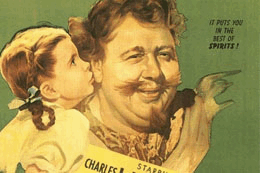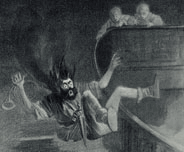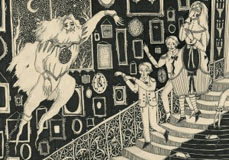“Be yourself; everyone else is already taken.” [1854 – 1900]
“Everything in moderation, including moderation.”♥ The Happy Prince ←
There is a statue of a gold prince in the middle of a really unhappy town. Then a swallow comes to sit on the statues plinth. Then the swallow sees the happy prince crying and asks him why. The prince says there is too much sadness in the town and that the swallow should take all the jewels off the statue and give them to those who need them. But then the swallow never flew away for the winter and dies. Also the greedy mayor of the town doesn’t think the statue is beautiful anymore without the jewels and orders for the prince to be melted down. But they find that the prince’s lead heart won’t melt so they throw it out.
Through out the story, an angel who has been ordered by god to find the two most precious things he can find on earth and bring them back to him. The angel brings back the dead swallow and the lead heart and God is happy and says that the swallow will now sing forevermore and the happy prince will always be happy.
• • • read by Stephen Fry ⇓
◊ ♦ → The Selfish Giant ↓ [a children story]
∇ Salome’s last dance ⇐[Ken Russell]
Herod Antipas, Tetrarch of Judea, begs his pubescent step-daughter Salome to dance for him, promising her anything she desires . . .
 HEROD ANTIPAS: – Come on… What is it that I got to say, I’ve forgotten? Yes, I remember what it was. Salome, come, come closer. . . I’m afraid you won’t hear me… You know my … my beautiful peacocks … my beautiful white peacocks… which live between the cypress trees and the myrtles in the garden? Hu-hu… Their heads are golden and the grain they eat is gold too, and their feet are dyed purple. The rain comes when they cry out; when they open up their tails the moon appears in the sky. They walk two by two they walk between the cypress-trees and the black myrtles, and each has a slave to look after it. Sometimes they fly through the trees, and sometimes they sleep in the grass by the pool. There are no animals in the world as beautiful as they. I’m sure no king on earth has birds so perfect. I’m sure even Caesar has no birds as beautiful, as fair as my birds. I will give you … fifty of them. They will go everywhere with you, and amongst them you’ll be like the moon in a great white cloud . . . . I will give them all to you. I have only a hundred, and there is no king on earth who has peacocks such as mine. I will give them all to you. But you must release me from my promise and not ask me what you have asked of me.
SALOME: – Give me the head of John theBaptist
HERODIAS: – Well said, my daughter. You are ridiculous with your white peacocks.
HEROD ANTIPAS: – Shut up! You’re always shouting. You screech like a bird a prey. Stop screeching like that!
Salome … Salome, think of what you’re doing. This man comes from God perhaps. I’m sure he comes from God. He is a holy man. The finger of God is upon him. Think of all those terrible words in his mouth. In the past, as in the desert, God is always with him. It’s possible, isn´t it? Well, we don’t know, but it’s possible that God is always with him. And it could be that if he dies something terrible happens to me. Well, he said the day he dies a great misfortune will happen to Sodom, it could only be me! … I know I heard the beating of winds in the air, the beating of giant winds … These were all very bad omens. There are others … I know there are others although I haven’t seen them. So Salome, you don’t want something terrible happen to me … Listen to me.
SALOME: – Give me the head of John theBaptist.
HEROD ANTIPAS: – Come on… What is it that I got to say, I’ve forgotten? Yes, I remember what it was. Salome, come, come closer. . . I’m afraid you won’t hear me… You know my … my beautiful peacocks … my beautiful white peacocks… which live between the cypress trees and the myrtles in the garden? Hu-hu… Their heads are golden and the grain they eat is gold too, and their feet are dyed purple. The rain comes when they cry out; when they open up their tails the moon appears in the sky. They walk two by two they walk between the cypress-trees and the black myrtles, and each has a slave to look after it. Sometimes they fly through the trees, and sometimes they sleep in the grass by the pool. There are no animals in the world as beautiful as they. I’m sure no king on earth has birds so perfect. I’m sure even Caesar has no birds as beautiful, as fair as my birds. I will give you … fifty of them. They will go everywhere with you, and amongst them you’ll be like the moon in a great white cloud . . . . I will give them all to you. I have only a hundred, and there is no king on earth who has peacocks such as mine. I will give them all to you. But you must release me from my promise and not ask me what you have asked of me.
SALOME: – Give me the head of John theBaptist
HERODIAS: – Well said, my daughter. You are ridiculous with your white peacocks.
HEROD ANTIPAS: – Shut up! You’re always shouting. You screech like a bird a prey. Stop screeching like that!
Salome … Salome, think of what you’re doing. This man comes from God perhaps. I’m sure he comes from God. He is a holy man. The finger of God is upon him. Think of all those terrible words in his mouth. In the past, as in the desert, God is always with him. It’s possible, isn´t it? Well, we don’t know, but it’s possible that God is always with him. And it could be that if he dies something terrible happens to me. Well, he said the day he dies a great misfortune will happen to Sodom, it could only be me! … I know I heard the beating of winds in the air, the beating of giant winds … These were all very bad omens. There are others … I know there are others although I haven’t seen them. So Salome, you don’t want something terrible happen to me … Listen to me.
SALOME: – Give me the head of John theBaptist. HEROD ANTIPAS: – You see? You’re not listening to me. Stay calm, I am calm, as you can see, so listen I have jewels hidden here that not even your mother has seen; in a casket of ebony, I have two amber goblets that look like golden apples. If an enemy puts poison into the goblets they become silver apples. In a chess I remember I have slippers incrusted with glass. I’ve got crooks from the country of the Serer, and bracelets garnished with jade from the city of Euphrates . . .
So tell me Salome, what do you want? Anything you desire I’ll give you. I’ll give you everything, except one thing. I’ll give you everything I own except my life – ha ha. I will give you the cloak of the High Priest. I’ll give you the veil of the sanctuary…
SALOME: – Give me the head of John theBaptist.
HEROD ANTIPAS: – Give her what she asks for. She’s truly her mother’s daughter
…
HEROD ANTIPAS: – You see? You’re not listening to me. Stay calm, I am calm, as you can see, so listen I have jewels hidden here that not even your mother has seen; in a casket of ebony, I have two amber goblets that look like golden apples. If an enemy puts poison into the goblets they become silver apples. In a chess I remember I have slippers incrusted with glass. I’ve got crooks from the country of the Serer, and bracelets garnished with jade from the city of Euphrates . . .
So tell me Salome, what do you want? Anything you desire I’ll give you. I’ll give you everything, except one thing. I’ll give you everything I own except my life – ha ha. I will give you the cloak of the High Priest. I’ll give you the veil of the sanctuary…
SALOME: – Give me the head of John theBaptist.
HEROD ANTIPAS: – Give her what she asks for. She’s truly her mother’s daughter
…
¤ ‘Each Man Kills The Thing He Loves’
A song featuring an excerpt from O. Wilde’s ‘The Ballad of Reading Gaol’ set to original music by Peer Raben [1940-2007]
←Peer Raben’s music …
Querelle is a 1982 film starring Brad Davis and directed by Rainer Werner Fassbinder, adapted from French author Jean Genet‘s 1947 novel Querelle de Brest. It marked Fassbinder’s final film as a writer/director; it was posthumously released just months after the director died in June 1982.
The lyrics of the song that Jeanne Moreau sings are from Oscar Wilde’s “The Ballad of Reading Gaol”, which was written in 1897 while in exile after his release from Reading Gaol prison. The line “Yet each man kills the thing he loves” was inspired by the hanging of Charles Thomas Wooldridge, a trooper in the Royal Horse Guards, who was convicted of slitting his wife’s throat.
◊ Jeanne Moreau ↓ [from Louis Malle’s ‘Ascenseur pour l’échafaud’]
Each man kills the thing he loves …Each man kills the thing he loves … Some do it with a bitter look,
some with a flattering word.
The coward does it with a kiss,
the brave man with a sword, with a sword … Each man kills the thing he loves … Each man kills the thing he loves … Some kill their love when they are young,
and some when they are old.
Some strangle with the hands of lust,
some with the hands of gold. The kindest use a knife because the dead so soon grow cold. Each man kills the thing he loves … Each man kills the thing he loves … Some love too little, some too long,
some sell and others buy. Some do the deed with so many tears,
and some without a sigh. For each man kills the thing he loves,
yet each man does not die. Each man kills the thing he loves …
Each man kills the thing he loves … da – da – da . .
◊ ‘Each Man Kills The Thing He Loves’, released in 1989, is the first track of debut album from Gavin Friday following his exit from the Virgin Prunes ↓ GAVIN FRIDAY & THE MAN SEEZER
Bass- Fernando Saunders; Cello– Hank Roberts; Drums & perc- Michael Blair; Guitar- Bill Frisell, Marc Ribot
Each man kills the thing he loves, by each let this be heard. Some do it with a bitter look, some with a flattering word.The coward does it with a kiss, the brave man with a sword. Some kill their love when they are young, some when they are old.
Some strangle with the hands of lust, some with the hands of gold. The kindest use a knife because the dead so soon grow cold. Each man kills the thing he loves – Each man kills the thing he loves Some love too little, some too long, some buy and other sell. Some do the deed with so many tears, and some without a sigh. For each man kills the thing he loves, yet each man does not die. Each man kills the thing he loves – Each man kills the thing he loves Some kill their love when they are young, some when they are old.
Some strangle with the hands of lust, some with the hands of gold. Some love too little, some too long, some buy and other sell. Some do the deed with so many tears, and some without a sigh. For each man kills the thing he loves, yet each man does not die.
θ → The Ballad of Reading Gaol, by Oscar Wilde ↓ [read by Nick Gisburne]
θ ‘Serenade’ ↓ (song by Colin Rudd)
The western wind is blowing fair
Across the dark Ægean sea,
And at the secret marble stair
My Tyrian galley waits for thee.
Come down! the purple sail is spread,
The watchman sleeps within the town,
O leave thy lily-flowered bed,
O Lady mine come down, come down!
She will not come, I know her well,
Of lover’s vows she hath no care,
And little good a man can tell
Of one so cruel and so fair.
True love is but a woman’s toy,
They never know the lover’s pain,
And I who loved as loves a boy
Must love in vain, must love in vain.
O noble pilot tell me true
Is that the sheen of golden hair?
Or is it but the tangled dew
That binds the passion-flowers there?
Good sailor come and tell me now
Is that my Lady’s lily hand?
Or is it but the gleaming prow,
Or is it but the silver sand?
No! no! ‘tis not the tangled dew,
‘Tis not the silver-fretted sand,
It is my own dear Lady true
With golden hair and lily hand!
O noble pilot steer for Troy,
Good sailor ply the labouring oar,
This is the Queen of life and joy
Whom we must bear from Grecian shore!
The waning sky grows faint and blue,
It wants an hour still of day,
Aboard! aboard! my gallant crew,
O Lady mine away! away!
O noble pilot steer for Troy,
Good sailor ply the labouring oar,
O loved as only loves a boy!
O loved for ever evermore!
♦ The Canterville Ghost ⇓ [read & listen]
When Mr. Hiram B. Otis, the American Minister, bought Canterville Chase,  every one told him he was doing a very foolish thing, as there was no doubt at all that the place was haunted. Indeed, Lord Canterville himself, who was a man of the most punctilious honour, had felt it his duty to mention the fact to Mr. Otis when they came to discuss terms.
every one told him he was doing a very foolish thing, as there was no doubt at all that the place was haunted. Indeed, Lord Canterville himself, who was a man of the most punctilious honour, had felt it his duty to mention the fact to Mr. Otis when they came to discuss terms.
‘We have not cared to live in the place ourselves,’ said Lord Canterville, ‘since my grandaunt, the Dowager Duchess of Bolton, was frightened into a fit, from which she never really recovered, by two skeleton hands being placed on her shoulders as she was dressing for dinner, and I feel bound to tell you, Mr. Otis, that the ghost has been seen by several living members of my family, as well as by the rector of the parish, the Rev. Augustus Dampier, who is a Fellow of King’s College, Cambridge. After the unfortunate accident to the Duchess, none of our younger servants would stay with us, and Lady Canterville often got very little sleep at night, in consequence of the mysterious noises that came from the corridor and the library.’
‘My Lord,’ answered the Minister, ‘I will take the furniture and the ghost at a valuation. I come from a modern country, where we have everything that money can buy; and with all our spry young fellows painting the Old World red, and carrying off your best actresses and prima-donnas, I reckon that if there were such a thing as a ghost in Europe, we’d have it at home in a very short time in one of our public museums, or on the road as a show.’
‘I fear that the ghost exists,’ said Lord Canterville, smiling, ‘though it may have resisted the overtures of your enterprising impresarios. It has been well known for three centuries, since 1584 in fact, and always makes its appearance before the death of any member of our family.’
‘Well, so does the family doctor for that matter, Lord Canterville. But there is no such thing, sir, as a ghost, and I guess the laws of Nature are not going to be suspended for the British aristocracy.’
‘You are certainly very natural in America,’ answered Lord Canterville, who did not quite understand Mr. Otis’s last observation, ‘and if you don’t mind a ghost in the house, it is all right. Only you must remember I warned you.’
 A few weeks after this, the purchase was completed, and at the close of the season the Minister and his family went down to Canterville Chase. Mrs. Otis, who, as Miss Lucretia R. Tappan, of West 53rd Street, had been a celebrated New York belle, was now a very handsome, middle-aged woman, with fine eyes, and a superb profile. Many American ladies on leaving their native land adopt an appearance of chronic ill-health, under the impression that it is a form of European refinement, but Mrs. Otis had never fallen into this error. She had a magnificent constitution, and a really wonderful amount of animal spirits. Indeed, in many respects, she was quite English, and was an excellent example of the fact that we have really everything in common with America nowadays, except, of course, language. Her eldest son, christened Washington by his parents in a moment of patriotism, which he never ceased to regret, was a fair-haired, rather good-looking young man, who had qualified himself for American diplomacy by leading the German at the Newport Casino for three successive seasons, and even in London was well known as an excellent dancer. Gardenias and the peerage were his only weaknesses. Otherwise he was extremely sensible. Miss Virginia E. Otis was a little girl of fifteen, lithe and lovely as a fawn, and with a fine freedom in her large blue eyes. She was a wonderful amazon, and had once raced old Lord Bilton on her pony twice round the park, winning by a length and a half, just in front of the Achilles statue, to the huge delight of the young Duke of Cheshire, who proposed for her on the spot, and was sent back to Eton that very night by his guardians, in floods of tears. After Virginia came the twins, who were usually called ‘The Stars and Stripes,’ as they were always getting swished. They were delightful boys, and with the exception of the worthy Minister the only true republicans of the family.
A few weeks after this, the purchase was completed, and at the close of the season the Minister and his family went down to Canterville Chase. Mrs. Otis, who, as Miss Lucretia R. Tappan, of West 53rd Street, had been a celebrated New York belle, was now a very handsome, middle-aged woman, with fine eyes, and a superb profile. Many American ladies on leaving their native land adopt an appearance of chronic ill-health, under the impression that it is a form of European refinement, but Mrs. Otis had never fallen into this error. She had a magnificent constitution, and a really wonderful amount of animal spirits. Indeed, in many respects, she was quite English, and was an excellent example of the fact that we have really everything in common with America nowadays, except, of course, language. Her eldest son, christened Washington by his parents in a moment of patriotism, which he never ceased to regret, was a fair-haired, rather good-looking young man, who had qualified himself for American diplomacy by leading the German at the Newport Casino for three successive seasons, and even in London was well known as an excellent dancer. Gardenias and the peerage were his only weaknesses. Otherwise he was extremely sensible. Miss Virginia E. Otis was a little girl of fifteen, lithe and lovely as a fawn, and with a fine freedom in her large blue eyes. She was a wonderful amazon, and had once raced old Lord Bilton on her pony twice round the park, winning by a length and a half, just in front of the Achilles statue, to the huge delight of the young Duke of Cheshire, who proposed for her on the spot, and was sent back to Eton that very night by his guardians, in floods of tears. After Virginia came the twins, who were usually called ‘The Stars and Stripes,’ as they were always getting swished. They were delightful boys, and with the exception of the worthy Minister the only true republicans of the family.
As Canterville Chase is seven miles from Ascot, the nearest railway station, Mr. Otis had telegraphed for a waggonette to meet them, and they started on their drive in high spirits. It was a lovely July evening, and the air was delicate with the scent of the pine-woods. Now and then they heard a wood pigeon brooding over its own sweet voice, or saw, deep in the rustling fern, the burnished breast of the pheasant. Little squirrels peered at them from the beech-trees as they went by, and the rabbits scudded away through the brushwood and over the mossy knolls, with their white tails in the air. As they entered the avenue of Canterville Chase, however, the sky became suddenly overcast with clouds, a curious stillness seemed to hold the atmosphere, a great flight of rooks passed silently over their heads, and, before they reached the house, some big drops of rain had fallen.
Mr. Otis had telegraphed for a waggonette to meet them, and they started on their drive in high spirits. It was a lovely July evening, and the air was delicate with the scent of the pine-woods. Now and then they heard a wood pigeon brooding over its own sweet voice, or saw, deep in the rustling fern, the burnished breast of the pheasant. Little squirrels peered at them from the beech-trees as they went by, and the rabbits scudded away through the brushwood and over the mossy knolls, with their white tails in the air. As they entered the avenue of Canterville Chase, however, the sky became suddenly overcast with clouds, a curious stillness seemed to hold the atmosphere, a great flight of rooks passed silently over their heads, and, before they reached the house, some big drops of rain had fallen.
Standing on the steps to receive them was an old woman, neatly dressed in black silk, with a white cap and apron. This was Mrs. Umney, the housekeeper, whom Mrs. Otis, at Lady Canterville’s earnest request, had consented to keep on in her former position. She made them each a low curtsey as they alighted, and said in a quaint, old-fashioned manner, ‘I bid you welcome to Canterville Chase.’
♦ ♦ From the 1996 VHS «Classic Fairy Tales from Around The World.» ↓ Animated in Russia.
¤→ The Picture of Dorian Gray ← [read & listen]
♦→ John Tomerlin’s Picture of Dorian Gray ⇐ (1973)
In late Victorian London, a beautiful young man is given a portrait of himself by an admiring artist. Soon after this he treats a young woman cruelly and then notices that his portrait seems to look meaner than it used to. Eventually he cannot endure the portrait and hides it in the attic. As the years pass, he becomes ever more unscrupulous and dissolute. His friends remark how he is as handsome as ever and never seems to age. But up in the attic his picture becomes uglier and uglier.
«Beauty is a form of Genius-is higher, indeed, than Genius, as it needs no explanation. It is one of the great facts of the world, like sunlight, or springtime, or the reflection in the dark waters of that silver shell we call the moon. It cannot be questioned. It has divine right of sovereignty.»– from The picture of Dorian Gray ↓ second chapter




great job. keep it up.http://www.geriquest.com
hi, great post. i really admire your work and ihttp://www.tigsoft.com
this article gives the light in which we can observe the reality. this is particularly a nice one and gives in-depth information. thanks for this nice article.http://www.conduiti.org
thanks for writing about it… http://www.casaemail.com.br
keep the good work by posting better posts, as you always do.http://www.acertemail.com
http://kohlerkitchenfaucets.org Thanks for that awesome posting. It saved MUCH time 🙂